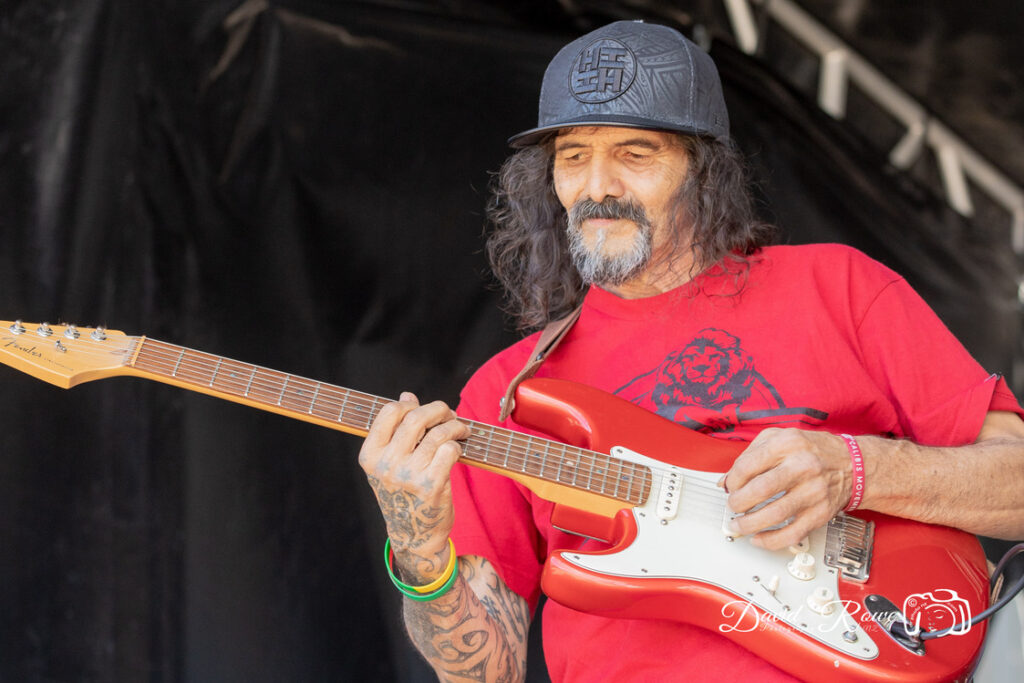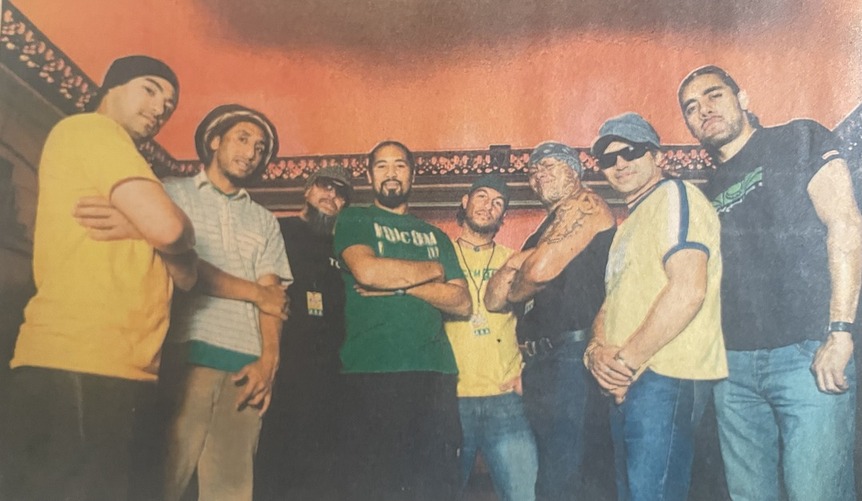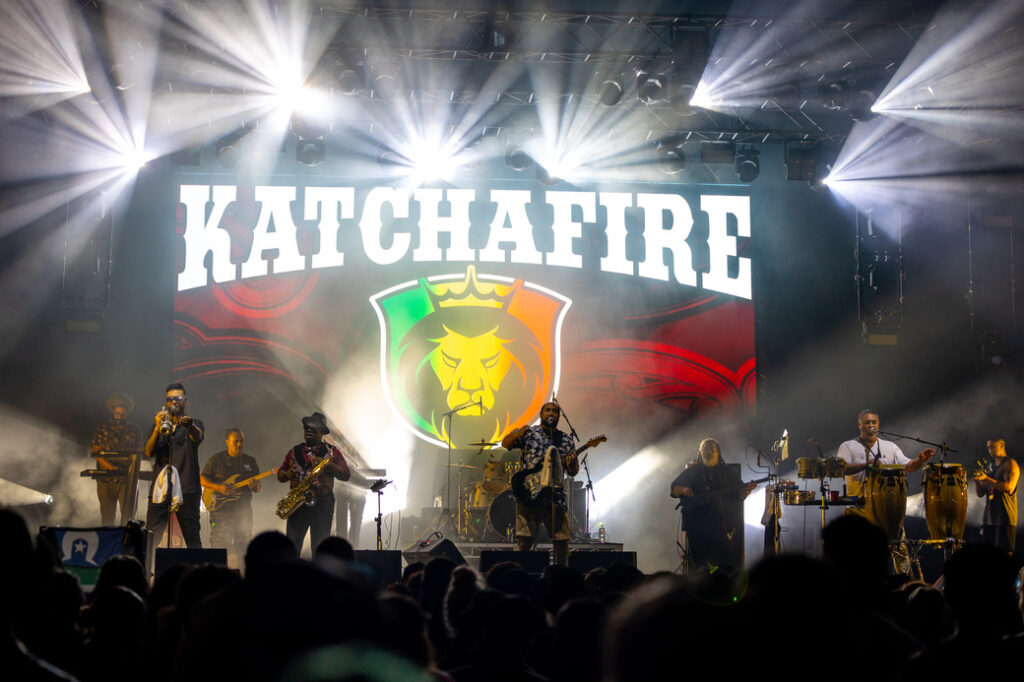How Katchafire Created an Iconic Band and a Family Legacy Too
Katchafire founder Grenville Bell takes Rolling Stone AU/NZ inside their journey to becoming one of the world's biggest roots reggae bands
The founding member of Katchafire may not have envisaged six albums, opening slots for internationally-renowned artists, and status among New Zealand’s most elite reggae groups, but when Grenville Bell had an epiphany to start a band in the ’90s, he didn’t doubt it would be a success.
Down on his luck, Grenville had lost his job and was looking for employment options in Hamilton city centre when he saw a flash of his future.
It was about 10:30 in the morning on a sunny day in 1997 when he noticed a busker strumming away on his guitar on Garden Place, playing a Bob Marley song.
“It sounded quite nice,” Grenville, now 69, recalls to Rolling Stone AU/NZ.
“At that particular moment, I was looking at a couple of phone numbers that I had got for work. I was heading home, and then I saw images of musicians around this guy. They were singing this song.
“I went, ‘Oh, Bob Marley tribute band.’ What I saw, it hit home to me. I thought, ‘We’ll do a Bob Marley tribute band, this is it. I’m going to start a band.’
“I didn’t stop and look back to make sure, I walked away, threw the piece of paper with a couple of phone numbers that I had in the rubbish bin, and headed down Victoria Street. I knew that’s what I had to do. It felt good in my mind and it felt good in my heart.”
Love Music?
Get your daily dose of everything happening in Australian/New Zealand music and globally.

Image: Grenville Bell Credit: David Rowe Photography
His son Jordan’s earliest memories are of his dad saying he wanted to start a band.
“We were at a concert and he had a vision that night. From there he started putting the pieces to the puzzle to get the wheels turning,” Jordan remembers.
With the idea forming in his mind, Grenville decided to bring his vision to life – and it seemed as though fate was on his side.
“He had this floor and two or three rooms he was renting out that suited us for a jam room,” Grenville says. “It was sort of like, ‘Oh, this is good.’ He asked me ‘what are you doing?’ I said ‘I’m going to start a band,’ and he said ‘do you want a bit of room to practice?'”
Just like that, the place, above the pub Armadillos, became the band’s centre. Grenville raced home with excitement, but had to do one more thing first.
“The next job was to come home and see the wife and tell her about my new venture,” he says with a big laugh. “I was a bit worried about that. I thought it might backfire and she’d tell me to get something a bit more decent, but she said, ‘Well, you better go and do what you’ve got to do.’ I had support from her right from the beginning.”
He began rallying together a group of talented musicians. His first picks were no-brainers – Jordan and his older brother Logan.
Logan was attending Toi Whakari at the Waikato Polytechnic (not affiliated with the drama school in Wellington), a program that included genealogy, kapa haka, and a focus on music, while Jordan was only about 15 at the time and still in school. He remembers his dad putting out a call for other musicians to come and audition.
They landed on a variety of players who came and went over the years, but the three family members formed the foundation of the band.
Logan, who’s now the lead singer, was just 17 when he started helping out with vocals. He’d finished his course that year, passing the Royal School of Music’s theory papers, improv classes, and Māori culture performances with Jordan a couple years behind. Grenville had been working on a farm when the work dried up.

Image: The early days of Katchafire Credit: Supplied
With his new plan in place, he gathered up the instruments from his shed they had collected over the years for their impromptu jam sessions and headed to Armadillos to set up.
“It was quite cool, we had a few bands up there. It was like a ‘semi-muso’ club. Everybody that came up there came to check us out,” Grenville says.
Through all hours of the night, the bar became a haven for creative minds to hone their skills, with Grenville staying back most nights to guard their instruments from the wandering public using the upstairs restroom.
In the early days of Katchafire, the focus remained on Bob Marley’s greatest hits – but it didn’t take long before original material came to the fore. The band began playing the circuits around Hamilton and Waikato before branching out of the North Island.
“There was no funding at that time in New Zealand for homegrown bands, especially reggae, so we were doing something totally new to the local music industry off the skin of our own backs, funding everything to get the start of the fire right,” Jordan says.
Their debut album, Revival, landed in 2002, featuring their first breakout hit, “Giddy Up”. Written by Jamey Ferguson, the track catapulted Katchafire to a new level – it was the highest-selling New Zealand single that year. Other album tracks such as “Get Away” and “Collie Herb Man” still rank among their most popular hits.
“I think everybody was ready for the first album – I think more than ready, so that album happened quite fast. It was all organic, all natural, everything fell into place. First albums are always good because it’s new ideas and all in unison, and being together and being a new band was even better,” Grenville says.
“It also gave everybody in the band motivation to write their own songs, because ‘Giddy Up’ was Jamey’s song – others were like, ‘Well, I’ve got a song too.'”
The floodgates were duly opened, leading to an array of magnetic songs, commonly consisting of classic reggae beats mixed with jazzy undertones, soothing vocals, alluring harmonies, and atmospheric melodies that struck Aotearoa listeners hard. Soon enough, Katchafire signalongs became a summer necessity.
The band’s mission came full circle when they found themselves opening for The Wailers, who inspired Katchafire’s name through their 1973 album, Catch a Fire.
International opportunities quickly arrived including concerts in Australia, where the Gold Coast especially took notice.
“We had heaps of Māori, heaps of Polynesian and Kiwis over there. It was a great connection for them to their roots – and it still is. It’s like home away from home,” Grenville says proudly.
With the momentum never slowing, Katchafire took on shows in Hawaii before delving into the west coast of the US.
“A lot of bands try to skip Hawaii and go straight from Auckland to L.A., [but] they find it quite hard. No one knows ya, no one’s going to turn up to your shows. So, for Māori bands, I try [to] encourage them to go and see the cuzzies first in Hawaii, do a few shows there for them, and then go to the mainland. It’s a whole lot better,” Grenville insists.
Katchafire’s stints abroad saw them gain a decent following within the reggae communities in California and Europe. Through their overseas success, Grenville says they’ve been able to take a heap of other Kiwi acts on the road, which is just as important to him.
“We’ve inspired a lot of other bands to get going and turn music into a business – how to manage that is another story,” he says, hinting at his extensive industry experience.
But more than the music, Grenville gifted his sons, now in their 40s, an everlasting legacy filled with endless opportunities. He’s had a front row seat to watch Jordan and Logan evolve into professional, world-class showmen – though he never really doubted their destiny.
“It’s such a big part of their lives. They have mad respect for me today. I used to play music to them through a speaker pressed up to my wife’s stomach, really light so they just could hear it. You could see their feet moving around, so by 15/16 years old they were ready to be musicians. I was just guiding them through the process in the safest and the best way.
“When we started travelling the world, we were playing with all these big bands. The boys would get ideas from other bands and they’d incorporate these ideas they’d picked up in Europe, from Julian Marley, The Wailers, UB40 – and they’d develop. It’s just throwing them in the ocean to teach them to swim.”
Katchafire have stayed true to their original goals, aiming to be about whānau, celebrating Indigenous roots and creativity while delivering an unforgettable experience through their songs and live shows.
“I guess the one thing that hasn’t changed is us as people, our message, and how we hold ourselves as Māori ambassadors for Aotearoa, representing our families, our culture, and reggae music. It’s doing our part to leave the world a better place,” Jordan says.
It hasn’t been easy at times, but they’ve learned how to be resilient and make an increasingly difficult vocation work in their favour.
“Being able to feed eight to 12 families for more than 20 years is one of the achievements I’m most proud of,” Jordan adds.
Following the releases of Slow Burning (2005), Say What You’re Thinking (2007), On the Road Again (2010), Best so Far (2013), and Legacy (2018), Katchafire are now focused on writing their seventh album, set to be released later this year.
View this post on Instagram
While Grenville is still heavily involved with the band as their manager, and has been known to jump up for a jam during a concert, he’s stepped back from the main lineup and is now focused on another group named Indica.
“These are songs I was supposed to do with Katchafire,” he reveals. “You’ve got so many writers in the band, but you’ve only got a certain amount of time and a certain amount of money, and it gets used up pretty quick.”
But Grenville hopes his two worlds can collide with a showcase that can have both bands on the bill. As he looks back at his work that now spans almost three decades, he says he’s amazed by the impact they’ve created.
“I’ve got a little bit used to the excitement… I’m completely satisfied as a person [in] regards to trying to achieve something in life when you’re forever battling things in the industry. We’ve made the pedestal for ourselves and now we’re standing on it,” Grenville says.
“The continuous music that’s coming out, these boys’ writing skills are just amazing. It just blows me away.”
Follow Katchafire on Instagram. Find their tour information here.




































